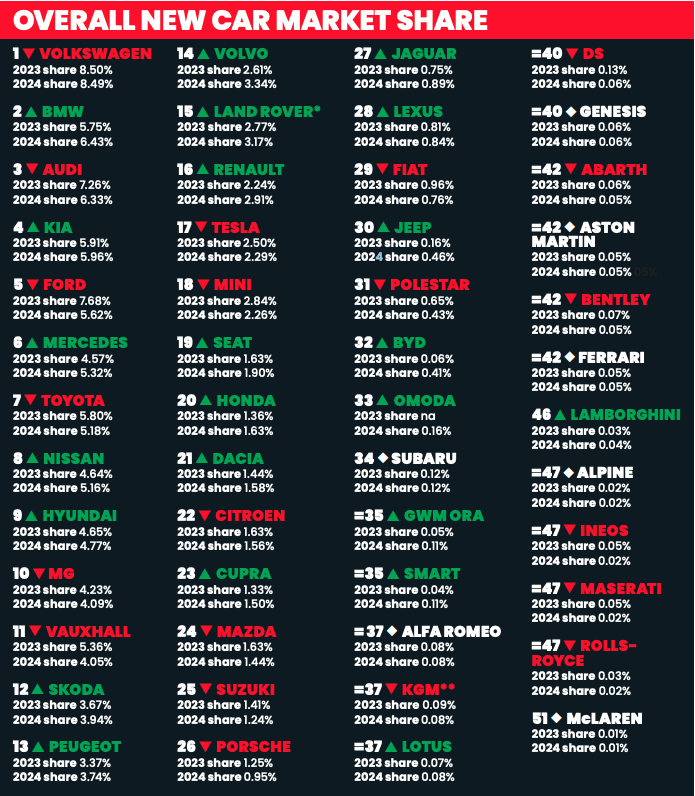This post was originally published on Autocar
Some easily hit or even exceeded the UK government’s 22% EV sales target for 2024, but others fell well short
Many car makers found ramping up EV sales to meet the UK government’s 22% target a struggle, especially those with a more volume bent.
But they’re a resourceful bunch, and those with EVs to sell rose to the challenge.
Traditional premium brands like Audi, BMW, Mercedes-Benz and Volvo definitely found it easier, thanks to their more wealthy corporate customer bases, while MG continued to satisfy budget buyers with its Chinese-built cars.
Next year should be easier, with cheaper EVs like the Vauxhall Frontera coming to the fore, but for many 2024 was a year to write off financially – at least on the EV side – as discounts, needed to entice customers and quash wider scepticism, eroded profits.
Audi
Audi continues to rely on demand for its Q4 E-tron compact SUV to bolster its impressive EV showing, although new models such as the larger Q6 E-tron are starting to make an impact.
EV sales mix 18%
EV market share 6.3%
Top seller Q4 E-tron
BMW
BMW aced its EV homework, taking the second-highest share in 2024, pushing it well past the ZEV mandate requirements. Its standout model was the i4 saloon, a favourite among fleet customers, but the iX1 crossover is also popular.
EV sales mix 27%
EV market share 9.4%
Top seller i4
BYD
The Chinese giant took an impressive 2% of the EV market in its first full year here, with the Atto 3 compact SUV leading the charge, followed by the Dolphin supermini. More models are coming soon, with PHEVs starting to supplement the all-EV diet.
EV sales mix 99%
EV market share 2.0%
Top seller Atto 3
Citroën
Tasty deals on the ë-C4 hatchback have saved the French brand on the EV front this year, but its real time to shine will be 2025, when the new ë-C3 supermini, priced from just £21,990, starts to affect the sales charts.
EV sales mix 13%
EV market share 1.1%
Top seller ë-C4
Cupra
Seat’s near-premium sibling brand carries Spanish EV hopes with just the Born hatchback, which continues to be popular with UK buyers. The Tavascan SUV is due next year for moral support, before the Raval supermini, which is Cupra’s big hope for EV penetration.
EV sales mix 25%
EV market share 2.1%
Top seller Born
DS
A dismal 2024 for Stellantis’s French premium marque in terms of EV sales, especially after the brand announced in 2021 it would be all-EV by this year. Just one model was available and buyers weren’t much interested.
EV sales mix 4.9%
EV market share 0.02%
Top seller 3 E-Tense
Fiat
Fiat’s strong start to the EV age stuttered in 2024 as falling demand for the 500e forced it to throttle production. Next year should be better as the bigger 600e becomes available, along with the cut-price Grande Panda supermini.
EV sales mix 11%
EV market share 0.4%
Top seller 500e
Ford
Ford’s EV thrust with the Volkswagen-based Explorer and Capri crossovers came too late to rescue slow sales of the pricier Mustang Mach-E SUV, leaving the brand well adrift of its ZEV mandate target. The recently unveiled Puma Gen-E will help next year.
EV sales mix 6.6%
EV market share 2.1%
Top seller Mustang Mach-E
Genesis
Hyundai’s premium brand continues to make little impact on the UK market overall, but what sales it does manage are veering far more towards EVs, with one of the highest electric shares of any ‘traditional’ car maker, at 76%, topped by the funky GV60 SUV.
EV sales mix 76%
EV market share 0.3%
Top seller GV60
Jaguar
Jaguar’s storming entry into the EV market in 2018 with the pioneering I-Pace SUV came to a sad end this year, leaving the JLR brand with no new cars to sell as it prepares to aim for a far wealthier target market with future EVs.
EV sales mix 19%
EV market share 1.1%
Top seller I-Pace
Jeep
Jeep’s first EV has made a sizeable impact on the US brand, the diminutive Avenger Electric accounting for more than a quarter of its sales this year. Many more petrol versions were sold, but Jeep still contributed nicely to Stellantis’s ZEV mandate goals.
EV sales mix 28%
EV market share 0.7%
Top seller Avenger Electric
Kia
The sensible Niro EV topped Kia’s list, but it was closely followed by the more exciting EV6, while the EV9 proved an unlikely hit, given its size, price and non-premium badge.
EV sales mix 14%
EV market share 4.5%
Top seller Niro EV
Lexus
Its sales may be small in the overall scheme of things, but Lexus has built a sizeable EV share within its own mix, led by the RZ, helping parent Toyota on its uphill task to hit its ZEV mandate target.
EV sales mix 20%
EV market share 0.9%
Top seller RZ
Lotus
The big Eletre SUV has outpaced the combustion-engined Emira sports car to boost Lotus’s EV sales and help parent company Geely hit its ZEV mandate target. Not that Geely needed it, with Volvo’s success.
EV sales mix 63%
EV market share 0.3%
Top seller Eletre
Mazda
Mazda had the toughest job of anyone, trying to shift only the short-range MX-30 crossover, and predictably the brand is well shy of its 22% ZEV mandate target. At least the range-extender version helped to lower Mazda’s CO2 average, boosting its credits.
EV sales mix 4.8%
EV market share 0.4%
Top seller MX-30
Mercedes
Mercedes comfortably did what the government required of it regarding EVs. In fact, the German brand was ahead of its target, thanks to sales of the EQA crossover, by far its most popular EV.
EV sales mix 25%
EV market share 6.6%
Top seller EQA
MG
MG continues to find enthusiastic buyers for its keenly priced 4 EV hatchback, putting the Chinese firm fifth in terms of overall EV market share. With the heavy lifting done, MG was able to concentrate on launching new models with combustion engines.
EV sales mix 27%
EV market share 6.1%
Top seller 4 EV
Mini
Mini may have swapped Oxford for China for its electric hatchback, but the improvements made to the model boosted sales. Helped by the new Countryman electric SUV, it made sure the brand didn’t hold parent firm BMW back from hitting its target.
EV sales mix 17%
EV market share 1.7%
Top seller Cooper E/SE
Nissan
This was a tough year for Nissan, during which it ended production of the Leaf hatchback with the replacement still a way off. The bigger Ariya SUV stepped in, but the brand will continue to struggle in 2025 without new products.
EV sales mix 12%
EV market share 3.5%
Top seller Ariya
Peugeot
Peugeot stormed into a comfortable position in terms of EV share with the launch of the lauded new e-3008 SUV, which hit the top 10 in later months of the year to outpace the brand’s relatively long-serving e-208 and e-2008.
EV sales mix 18%
EV market share 4.0%
Top seller e-3008
Polestar
There was a slump for Polestar as sales of the 2 saloon tailed off sharply. Thankfully, the 4 fastback and then the bigger 3 SUV stepped in, giving hope for the Geely-owned Swedish premium brand in 2025.
EV sales mix 100%
EV market share 2.4%
Top seller 2
Porsche
Porsche suffered terribly in 2024 as the launch of the overhauled Taycan with its much improved technology put the brakes on sales of the original model. Still, despite sharply lower sales, EVs still accounted for a fifth of the brand’s tally, helped towards the end of 2024 by the new Macan Electric SUV.
EV sales mix 20%
EV market share 1.0%
Top seller Taycan
Renault
With no more Zoe and sales of the Megane crossover plateauing, Renault had to sit out 2024 in terms of EV growth while the market built for the new Scenic family SUV. Expect rocketing growth next year with the launch of the design-focused 5 supermini.
EV sales mix 11%
EV market share 1.9%
Top seller Megane
Rolls-Royce
Rolls-Royce has stealthily become one of the biggest sellers of EVs among traditional brands as measured by the share of its sales, as the new Spectre coupé accounted for almost half of the ultra-luxury marque’s sales.
EV sales mix 48%
EV market share 0.1%
Top seller Spectre
Skoda
A big push towards the end of the year to sell the Enyaq put the SUV atop the EV charts in October, ousting Tesla, MG and the premium brands. The Czechs can count on the smaller and cheaper Elroq SUV next year.
EV sales mix 14%
EV market share 3.0%
Top seller Enyaq
Smart
Smart is all-electric these days, led by the #1 small SUV and joined this year by the bigger, more coupé-styled #3. Sadly, this was the year it said goodbye to the unique Fortwo city car.
EV sales mix 100%
EV market share 0.6%
Top seller #1
Tesla
Tesla stayed on top of the EV market, but the impetus from other brands to sell EVs as well as a drop in sales cut the American maker’s share from 16% to 12%. The Model Y SUV remains the bestselling EV outright.
EV sales mix 100%
EV market share 12%
Top seller Model Y
Toyota
Toyota had no choice but to push its mid-sized bZ4X SUV into the UK market in the absence of any other electric products, but that’s expected to change in 2025 with the launch of the Urban Cruiser on partner firm Suzuki’s new eVitara.
EV sales mix 7%
EV market share 2.4%
Top seller bZ4X
Vauxhall
Vauxhall is keenly awaiting the arrival of the Frontera family SUV on Stellantis’s budget Smart Car platform, which will undercut the expensive Mokka Electric on price. The arrival of the Astra Electric helped in 2024 and the Corsa Electric posted okay sales, but neither is easy to sell profitably.
EV sales mix 16%
EV market share 4.3%
Top seller Mokka Electric
Volkswagen
A big push towards the end of the year sent sales of the ID 4 soaring, but Volkswagen still struggled to reach its onerous target when customers were clamouring for combustion-engined Golfs, T-Rocs and Tiguans.
EV sales mix 12%
EV market share 5.6%
Top seller ID 4
Volvo
Volvo won the battle of the traditional premium brands when it came to EV share of its own sales, helped by sales of the diminutive EX30 crossover. Parent firm Geely will be doing very nicely selling credits to makers trying to avoid fines after their own EV sales fell short.
EV sales mix 29%
EV market share 5.2%
Top seller EX30


